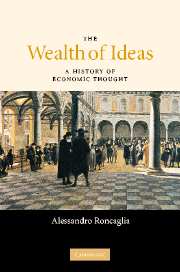Book contents
- Frontmatter
- Contents
- Preface
- 1 The history of economic thought and its role
- 2 The prehistory of political economy
- 3 William Petty and the origins of political economy
- 4 From body politic to economic tables
- 5 Adam Smith
- 6 Economic science at the time of the French Revolution
- 7 David Ricardo
- 8 The ‘Ricardians’ and the decline of Ricardianism
- 9 Karl Marx
- 10 The marginalist revolution: the subjective theory of value
- 11 The Austrian school and its neighbourhood
- 12 General economic equilibrium
- 13 Alfred Marshall
- 14 John Maynard Keynes
- 15 Joseph Schumpeter
- 16 Piero Sraffa
- 17 The age of fragmentation
- 18 Where are we going? Some (very tentative) considerations
- References
- Index of names
- Subject index
- References
References
Published online by Cambridge University Press: 22 September 2009
- Frontmatter
- Contents
- Preface
- 1 The history of economic thought and its role
- 2 The prehistory of political economy
- 3 William Petty and the origins of political economy
- 4 From body politic to economic tables
- 5 Adam Smith
- 6 Economic science at the time of the French Revolution
- 7 David Ricardo
- 8 The ‘Ricardians’ and the decline of Ricardianism
- 9 Karl Marx
- 10 The marginalist revolution: the subjective theory of value
- 11 The Austrian school and its neighbourhood
- 12 General economic equilibrium
- 13 Alfred Marshall
- 14 John Maynard Keynes
- 15 Joseph Schumpeter
- 16 Piero Sraffa
- 17 The age of fragmentation
- 18 Where are we going? Some (very tentative) considerations
- References
- Index of names
- Subject index
- References
- Type
- Chapter
- Information
- The Wealth of IdeasA History of Economic Thought, pp. 515 - 563Publisher: Cambridge University PressPrint publication year: 2005



